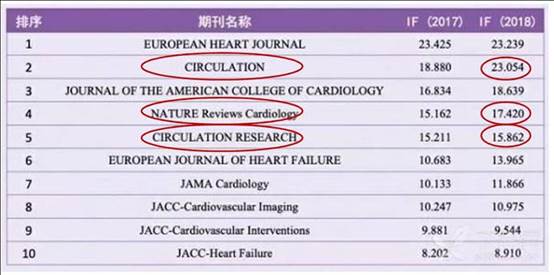Recently, Yuzhen Zhang’s team from State
Key laboratory of Cardiovascular Diseases, Tongji University School of
Medicine, Shanghai East Hospital Affiliated to Tongji University has made great
progress in cardiovascular research under the leadership of Zhongmin Liu,
President of Shanghai East Hospital, with their researches published in AHA
authoritative journals Circulation, Circ Res and Arterioscler
Thromb Vasc Biol. They revealed critical regulatory mechanisms of
transcriptional factors in cardiac failure, arteriosclerosis and vascular
restenosis. With collaboration of Prof.Cheng Yu from The Institute for
Biomedical Engineering and Nano Science, TUSM, they developed nanomaterials
targeting vascular endothelium and successfully achieved targeted gene
regulation of endothelial cells. They reversed pathological myocardial
remodeling and delayed occurrence and development of arteriosclerosis by
precisely regulating target gene expression in endothelial cells, providing
important knowledge for preventing and treating coronary heart disease, heart
failure and restenosis after vascular injury.
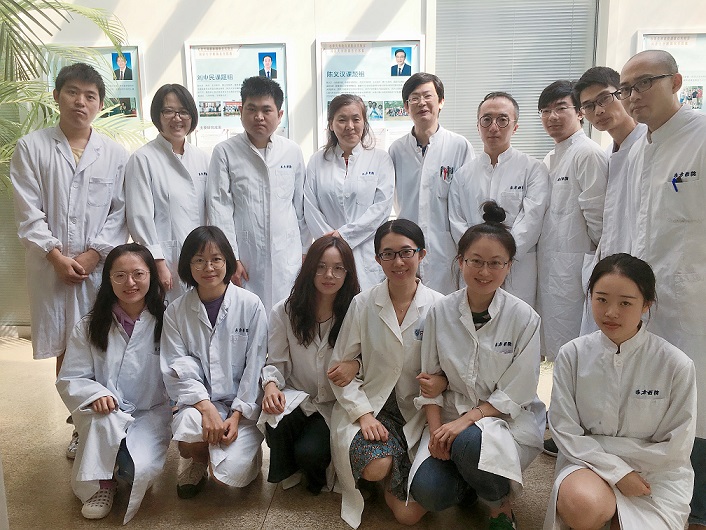
Photo
of Yuzhen Zhang and her team
Zhang Yuzhen’ s research team published one
of their researches online in Arterioscler Thromb Vasc Biol on April 4,
2019. This research article reveals the critical function of transcriptional
factor GATA6 in regulation of vascular endothelial proliferation after vascular
injury. The research shows smooth muscle-specific GATA6 knockout significantly
increases endothelial proliferation, whereas endothelial cell-specific GATA6
knockout significantly decreases endothelial proliferation. Further study shows
in vascular smooth muscle GATA6 upregulates expression of cellular matrix
protein CCN5 to inhibit endothelial proliferation, whereas in endothelial cells
GATA6 upregulates expression of PDGF-B to promote proliferation and migration
of smooth muscle in paracrine manner and thus exacerbate endothelial
proliferation. This research helps us to further understand molecular mechanism
of vascular endothelial proliferation after stent implantation and provides us
with new ideas for discovering drug target of restenosis after stent
implantation. The first authors are postdoctor Zhuang Tao, associate research
fellow Liu Jie and research assistant Chen Xiaoli from Shanghai East Hospital
affiliated to Tongji University. The correspondence authors are Liu Zhongmin,
President of Shanghai East Hospital, Prof. Zhang Yuzhen and research fellow Lin
Zhang. The work is supported by National Natural Science Foundation, National
Key Research and Development Program, Science and Technology Commission of
Shanghai Municipality and Outstanding Leaders Training Program of Pudong Health
Bureau of Shanghai.
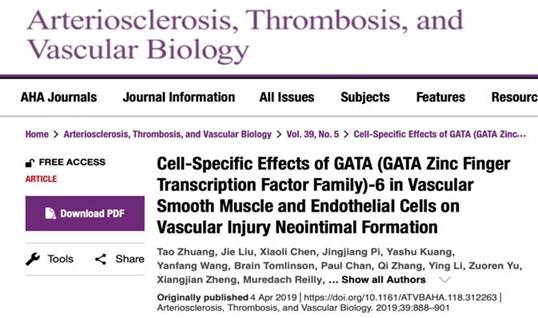
Link:https://www.ahajournals.org/doi/10.1161/ATVBAHA.118.312263
Again, another research of this team was
published online in first class journal in cardiovascular research Circulation
on July 18, 2019. This work reveals that regulatory network of transcription
factor Klf2-Foxp1 plays an important role in regulating inflammation body
complex activation to control occurrence and development of arteriosclerosis.
They find that expression of Foxp1 decreases dramatically in arteriosclerosis
and susceptible area and endothelial cell-specific Foxp1 knockout significantly
increases arteriosclerosis while overexpression of Foxp1 in endothelial cell
inhibits occurrence of arteriosclerosis. Further study shows that Foxp1
negatively regulates inflammation body complex Nlrp3-Caspase1-IL1β to delay occurrence and
development of arteriosclerosis. In addition, this ream found that Foxp1 is
responsive to change of shear force of blood flow, revealing important
molecular mechanism of blood flow shear force affecting occurrence and
development of arteriosclerosis. More importantly, this team found that statins
can induce expression of Klf2 and Foxp1, revealing that novel mechanism of
statins treating arteriosclerosis and thus providing new evidence and ideas for
coronary heart disease therapy. This work received attention and positive
reviews from academic peers at home and abroad with commentary and
recommendation of Gregory B. Lim, chief editor of top review journal in
cardiology, Nature Reviews Cardiology. The first authors are postdoctor Zhuang
Tao, associate research fellow Liu Jie and research assistant Chen Xiaoli from
Shanghai East Hospital affiliated to Tongji University. The correspondence
authors are Prof. Liu Yuzhen and Prof. Liu Zhongmin from Shanghai East Hospital
affiliated to Tongji University and Prof. Muredach Reilly from Columbia
University. This work received great support of Prof. Cheng Yu from Institute
for Biomedical Engineering and Nano Science, Tongji University and Prof. Wang
Haikun from Key Laboratory of Molecular Virology and Immunology, Chinese
Academy of Sciences and was supported by National Natural Science Foundation,
National Major Program of Development Fund, Science and Technology Commission
of Shanghai Municipality and Outstanding Leaders Training Program of Pudong
Health Bureau of Shanghai.
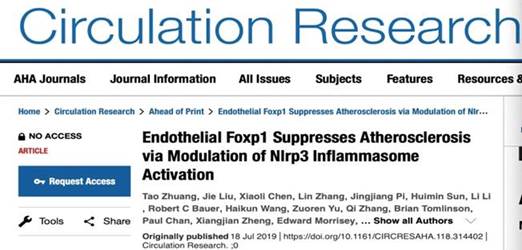
link:https://www.ahajournals.org/doi/abs/10.1161/CIRCRESAHA.118.314402
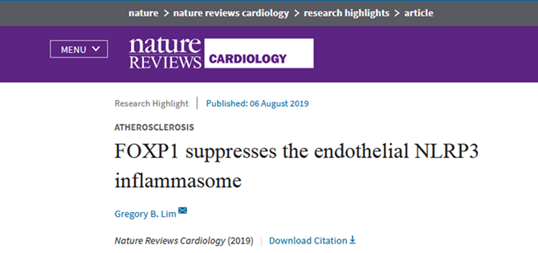
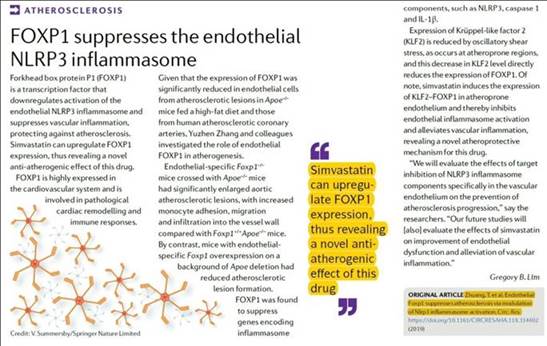
Good news again from Yuzhen Zhang’ research
team—top journal in cardiology Circulation published the team’s another
research on June 10, 2019. The team identified a key transcription factor Foxp1
in regulation of pathological cardiac remodeling. Endothelial cell-specific
knockout of Foxp1 exacerbates pathological cardiac remodeling and reduces
cardiac function, while endothelial cell-specific overexpression of Foxp1
ameliorates pathological cardiac remodeling and improves cardiac function. The
team dissected that TGFβ1 signal pathway is Foxp1’s downstream target and inhibitors
of TGFβ can reverse
cardiac remodeling caused by Foxp1 deficiency. Systemic inhibition of TGFβ could reverse pathological
cardiac remodeling, although there was an increase in mortality of laboratory
animals. As a result, the team used RGD-peptide magnetic nanoparticle target
delivery of TGF-β1–siRNA to ECs and validated endothelial cell-specific
inhibition of TGFβ can
ameliorate pathological cardiac remodeling and cardiac dysfunction, providing
new ideas and methods for preventing and treating heart failure. The first
authors are associate research fellow Liu Jie, postdoctor Zhuang Tao and
clinician Pi Jinjiang from Shanghai East Hospital affiliated to Tongji
University. The correspondence authors are Prof. Zhang Yuzhen, Prof. Liu Zhogmin
and research fellow Zhang Lin from Shanghai East Hospital affiliated to Tongji
University. This work received great support of Prof. Cheng Yu from Institute
for Biomedical Engineering and Nano Science, Tongji University and Prof. Wang Haikun
from Key Laboratory of Molecular Virology and Immunology, Chinese Academy of
Sciences and was supported by National Natural Science Foundation, National Major
Program of Development Fund, Science and Technology Commission of Shanghai
Municipality and Outstanding Leaders Training Program of Pudong Health Bureau
of Shanghai.
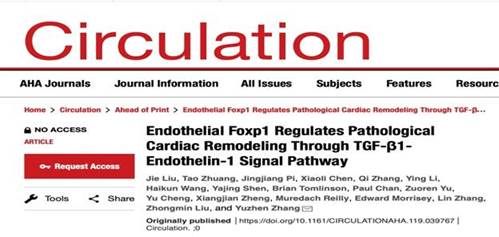
Link:
https://www.ahajournals.org/doi/abs/10.1161/CIRCULATIONAHA.119.039767
These researches were primarily
accomplished in Tongji University. Within 5 years only, Yuzhen Zhang’s team has
built systematic animal models of coronary heart disease and vascular lesion,
introduced and established varieties of tool mice and transgenic mice,
systematically completed research system of coronary disease and vascular
lesion and set up world-class research system of coronary heart disease and
vascular lesion. In the last 5 years, this team has got grants from 7 General
Programs, 2 Young Scientists Funds, 1 Major Research Plan of NNSF and 1 National Basic Research Program of China (973 Program)
of Ministry of Science and Technology. The team has published 9 SCI indexed
articles, including 1 in Circulation, 2 in Cir Res, 1 in Arterioscler
Thromb Vasc Biol and 1 in Theranostics with a cumulative impact
factor of 87.
Notes: Circulation is ranked No. 2
in cardiology journals of an impactor factor 23.054, Nature Reviews
Cardiology No. 4 of 17.420 and Cir Res No. 5 of 15.862.
